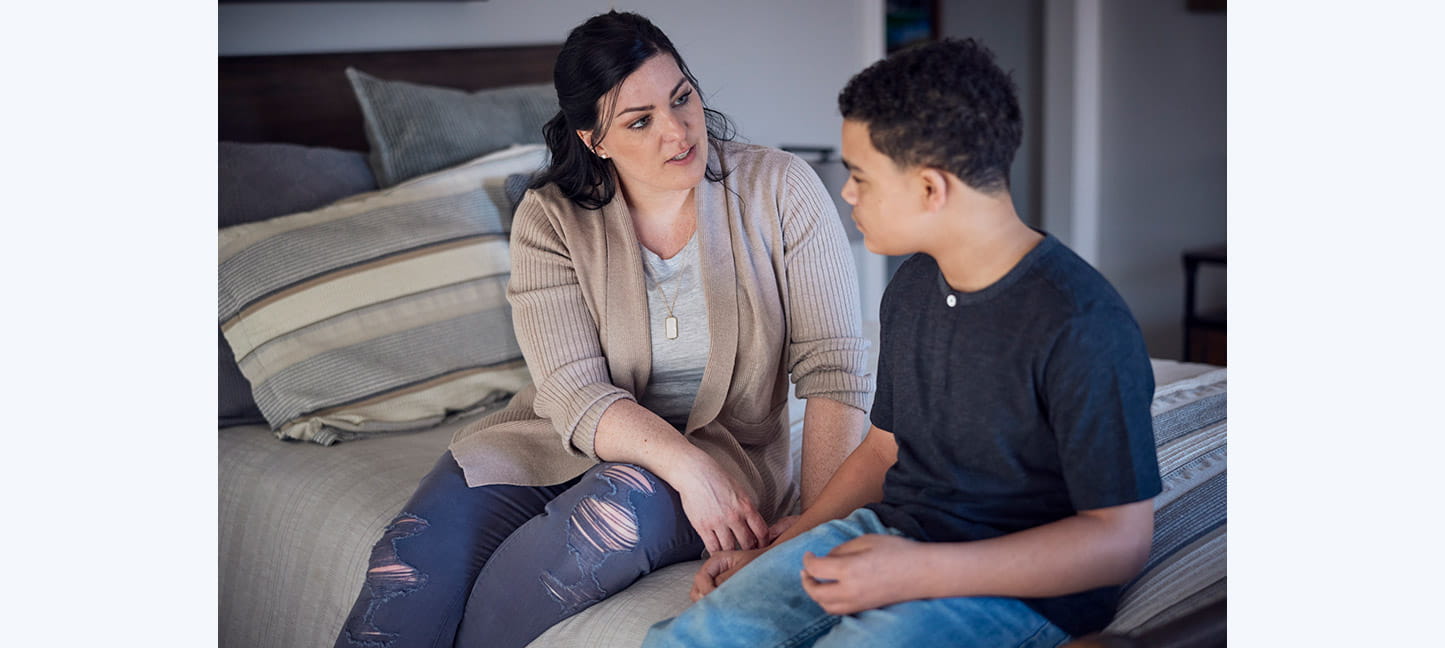5 ways to prepare for a conversation with your teen about drugs and alcohol

Parenting a teenager comes with no shortage of big conversations. From grades and friendships to independence and responsibility, there’s always something new to navigate. One of the most important — and often the most intimidating — is talking about drugs and alcohol.
At Main Line Health, we see every day how these conversations can shape healthier choices and stronger family connections. Parents often tell us they don’t know how to start, or they worry about saying the wrong thing. But preparing ahead of time can help you approach the topic with confidence and compassion — and make it a conversation your child will actually remember.
Here are five ways to get ready.
Create a safe space
Picture this: Your teen walks in the door after school, clearly frustrated from a rough day. It’s tempting to seize the moment and ask questions, but that isn’t the best time to bring up substance use. Instead, look for calmer moments. Maybe you’re driving together, or maybe it’s a late-night kitchen chat when phones are down and the house is quiet.
Safe space means your child feels heard, not judged. When they know you’re starting from a place of care — not punishment — they’re more likely to open up.
Listen more than you talk
Many parents say, “I try to talk to my teen, but they just shut down.” Often, the key isn’t talking more — it’s listening better.
Start by asking open-ended questions:
- “What pressures do kids your age face when it comes to drinking or drugs?”
- “How do you feel about the choices some of your friends are making?”
- “If you were in a tough situation, what would help you feel supported?”
Then, really listen. Nod, keep your body language open and resist the urge to jump in with advice too quickly. Teens are more likely to share when they believe their thoughts are valued. And if they see you staying calm, even when you hear something that worries you, they’ll be more willing to keep the conversation going in the future.
Be transparent about why you’re asking
Your teen can sense when something’s on your mind. Instead of dancing around it, be upfront. You might say:
- “I’ve noticed you’ve seemed stressed lately, and I just want to check in.”
- “This is something that’s important to me as your parent, and I want you to know you can always come to me.”
Being transparent makes it clear that your concern comes from love, not control. It also models honesty — which is exactly what you’re hoping for from them.
Keep health and safety at the center
It’s easy for a conversation about drugs and alcohol to slip into warnings or discipline. But framing it around overall health helps teens see the bigger picture.
Just as you encourage brushing teeth, getting enough sleep or eating well, avoiding drugs and alcohol is about balance and self-care. Teens often respond better when they see that you’re not just trying to enforce rules — you’re helping them protect their future.
You might say: “My job is to keep you safe and help you grow into a healthy adult. Staying away from drugs and alcohol is part of that — just like making sure you eat, sleep and stay active.”
Remind them they’re not alone
Even with the best intentions, some teens may not feel comfortable opening up to a parent. That’s okay — what matters is that they know where else to turn.
You can reassure them by pointing to other trusted adults:
“If you don’t feel like talking to me, that’s alright. You can always talk to your coach, your counselor or even your aunt. What matters is that you have someone safe to go to.”
For many teens, knowing they have a wider circle of support — including professional counselors or peer groups — takes the pressure off.
“When parents prepare for these conversations, they’re building more than dialogue — they’re building trust. And that trust is what makes adolescents feel safe enough to share their struggles, instead of facing them alone.”
— April Washington, MSW, LSW, Behavioral Health Therapist, Main Line Health
Talking about substance use with your child is never easy. You may second-guess your words or worry that the conversation won’t go the way you hoped. But remember: every time you try, you’re showing your child that they’re not alone in facing these challenges.
And you don’t have to do it alone, either. There are resources and support for both parents and teens, helping families navigate challenges together. At Main Line Health, our mental health specialists provide compassionate, evidence-based care through counseling and outpatient programs. For families facing substance use challenges, Mirmont Treatment Center offers dedicated addiction support, including treatment programs designed specifically for adolescents. Together, we walk alongside families every step of the way.
 Content you want, delivered to your inbox
Content you want, delivered to your inbox
Want to get the latest health and wellness articles delivered right to your inbox?
Subscribe to the Well Ahead Newsletter.
